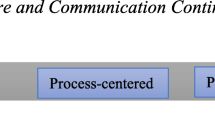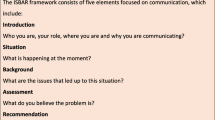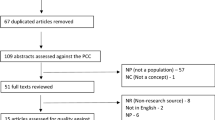Abstract
Providers oftentimes need to have difficult conversations with patients facing a poor prognosis. Research indicates that providers generally feel ill prepared for these conversations and that bad conversations may lead to more anxiety for patients. Communication skills development training programs have shown improvement in providers’ skills. Our cancer center embarked on skills development training to help providers improve their skills and comfort in having serious illness conversations. During our phased approach, about 500 physicians and advanced practice providers in the Division of Oncology were trained for over a year. Their level of comfort with serious illness conversations was measured before and after the training by using both quantitative and qualitative methods. We found that mean and median comfort scores increased from pre-training to post-training. The findings suggest that the improved comfort and confidence observed among providers who undergo communications skills training can lead to better provider-patient communication, more patient-centered care, and improved patient satisfaction.
Similar content being viewed by others
Data Availability
The data utilized in this study are not available for public access.
References
Reich AJ, Reich JA, Mathew P (2022) Advance care planning, shared decision making, and serious illness conversations in onconephrology. Semin Nephrol 42(6):151349
Lin JA, Im CJ, O’Sullivan P, Kirkwood KS, Cook AC (2021) The surgical resident experience in serious illness communication: a qualitative needs assessment with proposed solutions. Am J Surg 222(6):1126–1130
Lakin JR, Block SD, Billings JA, Koritsanszky LA, Cunningham R, Wichmann L et al (2016) Improving communication about serious illness in primary care: a review. JAMA Intern Med 176(9):1380–1387
Paladino J, Kilpatrick L, O’Connor N, Prabhakar R, Kennedy A, Neal BJ et al (2019) Training clinicians in serious illness communication using a structured guide: evaluation of a training program in three health systems. J Palliat Med 23(3):337–345
Baxter R, Fromme EK, Sandgren A (2022) Patient identification for serious illness conversations: a scoping review. Int J Environ Res Public Health 19(7):4162
Mata ÁNdS, de Azevedo KPM, Braga LP, de Medeiros GCBS, de Oliveira Segundo VH, Bezerra INM et al (2021) Training in communication skills for self-efficacy of health professionals: a systematic review. Human Resources for Health 19(1):30
Back AL, Arnold RM, Baile WF, Fryer-Edwards KA, Alexander SC, Barley GE et al (2007) Efficacy of communication skills training for giving bad news and discussing transitions to palliative care. Arch Intern Med 167(5):453–460
Markin A, Cabrera-Fernandez DF, Bajoka RM, Noll SM, Drake SM, Awdish RL et al (2015) Impact of a simulation-based communication workshop on resident preparedness for end-of-life communication in the intensive care unit. Crit Care Res Pract 2015:534879
Bloom JR, Marshall DC, Rodriguez-Russo C, Martin E, Jones JA, Dharmarajan KV (2022) Prognostic disclosure in oncology - current communication models: a scoping review. BMJ Support Palliat Care 12(2):167–177. https://doi.org/10.1136/bmjspcare-2021-003313
Nortjé N, Stepan K (2021) Advance care planning conversations in the oncology setting: tips from the experts. J Cancer Educ 36(2):325–329
Daubman BR, Bernacki R, Stoltenberg M, Wilson E, Jacobsen J (2020) Best practices for teaching clinicians to use a Serious Illness Conversation Guide. Palliat Med Rep 1(1):135–142
Author information
Authors and Affiliations
Contributions
All authors contributed to the study conception and design. Material preparation, data collection, and analysis were performed by E. Adaji, M. Johnson, and N. Nortje. The first draft of the manuscript was written by E. Adaji, M. Johnson, and N. Nortje, and all authors commented on previous versions of the manuscript. All authors read and approved the final manuscript.
Corresponding author
Ethics declarations
Consent to Participate
Since this was not a research study, but a quality improvement project, completion of the evaluation forms was voluntary with no identifiers requested/stored.
Competing Interests
The authors declare no competing interests.
Additional information
Publisher's Note
Springer Nature remains neutral with regard to jurisdictional claims in published maps and institutional affiliations.
Rights and permissions
Springer Nature or its licensor (e.g. a society or other partner) holds exclusive rights to this article under a publishing agreement with the author(s) or other rightsholder(s); author self-archiving of the accepted manuscript version of this article is solely governed by the terms of such publishing agreement and applicable law.
About this article
Cite this article
Adaji, E., Johnson, M., George, M.C. et al. Enhancing Oncologists’ Comfort with Serious Illness Conversations: The Impact of Serious Illness Conversation Guide (SICG) Training. J Canc Educ (2024). https://doi.org/10.1007/s13187-024-02441-w
Accepted:
Published:
DOI: https://doi.org/10.1007/s13187-024-02441-w




